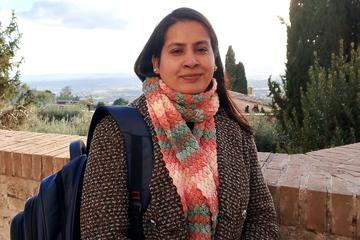
By Laura Ieraci
WASHINGTON, D.C. — Susan Timoney did not expect when she began full time this fall at The Catholic University of America that she would be helping students deal with the fallout from the recent sex abuse scandal in the Church or contributing to the development of a certificate program that will train people to help survivors of abuse.
In addition to teaching theology, Timoney was asked to facilitate four listening sessions — three with current students and one with alumni — intended to provide a safe place for people to voice concerns, fears and questions they had about sex abuse in the Church.
“It was a great opportunity to apply pastoral theology,” said Timoney, who earned a doctorate in sacred theology from the Pontifical University of St. Thomas Aquinas in Rome and worked with the Dallas Charter. “I was happy to share my expertise,” she said. Timoney also led three parish-based listening sessions on the same topic.
“These are really difficult times for the Church
Prior to becoming associate professor of pastoral studies and associate dean of undergraduate studies at CUA, Timoney, a Lay Centre alumna, had worked for the Archdiocese of Washington as the secretary for pastoral ministry and social concerns.
She began working for the archdiocese in 2008, in the role of executive director of evangelization and family life. In 2011, the archdiocese created the Secretariat for Pastoral Ministry and Social Concerns, and Timoney was named assistant secretary, before becoming the secretary in 2015.
“For the students, it was the first time they heard about the abuse,” said Timoney, pointing out that the students were toddlers when the first sex abuse scandal broke in the United States in 2002.
Timoney said Catholic higher education has a lot to offer in dealing with the crisis, as much as “a community rooted in prayer,” as “a school of discipleship” and as a centre of formation.
She said CUA is developing a certificate program that will train people to help survivors of abuse; the program should get off the ground in the next year.
During the listening sessions in the parish this past fall, Timoney said the people expressed the need to have more transparency in the Church, as well as the need to have greater responsibility and accountability among Church leadership.
She also observed the need for more formation on the faith and on the Church, even among practicing Catholics, noting two areas in particular. The first is on the co-responsibility of bishops, priests and laity as the Body of Christ, that is, on the nature of the Church.
“How do we exercise co-responsibility, and how can we mature in our understanding of how co-responsibility works beyond the finance and pastoral councils?” she said.
The second area would be in developing a better understanding of the role of bishops as shepherds, “how they understand their leadership of the people of God” and to whom are they accountable, she said.
There is also a need for more formation on the gift of celibacy to the Church, she said.
Timoney recognized the problem of clericalism as regards the current Church crisis and underlined the need to shift to an understanding of the priesthood as “rooted in service and humility.”
She added, however, that “at the root” of the crisis is sin. Two sins stand out most, she said: “the sins against the dignity of the person and the sins against creating an environment where the dignity of the person is protected.”


